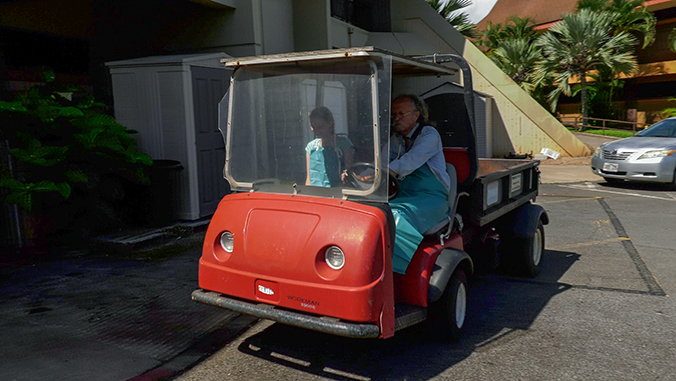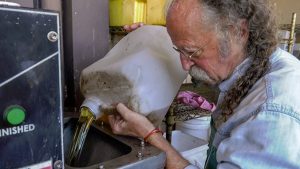Chemistry, culinary and economics students are involved in an award-winning sustainability project at Kapiʻolani Community College that they hope will serve as a model for others.
The fertilizer in the culinary program’s garden, and the fuel running a campus golf cart, all started as used cooking oil from the college’s kitchens.
The waste cooking oil goes into a processor on campus, and biodiesel and (the byproduct) glycerin come out.
The chemistry students are researching the optimal formula to fertilize their campus garden and culinary students will monitor the yield of crops from the garden which will be used in the preparation of meals served in cafeteria. The chemistry students are also researching using glycerin for candles and a degreaser, as well as cosmetic and Hawaiian medicinal uses. Economics students will use the glycerin for an entrepreneurial marketing project to develop an all-natural bar soap.
The sustainability effort won the 2018 UH President’s Green Project award and $10,000.
“I really enjoy this project because it’s a real world application of what I learned in the class,” said Victoria Hallett, a natural science biology student who submitted the grant proposal.
Through a dual-credit program, Kaimuki Christian School seniors Elise and Emily Kuwaye are among the chemistry students working on the project.
“I think it goes to show that you don’t necessarily need millions of dollars in order to forward the protection of our environment,” said Elise Kuwaye.
Emily Kuwaye added, “What I’m hoping will come out of this project is just new ways for us to be more sustainable.”
Another team member Celeste Guiles was a dual-credit homeschooled student last year who is a full-time Kapiʻolani CC student this year. The chemistry students have already learned six different ways to test the biodiesel for purity and quality.
“We live on an island, so sustainability becomes very important,” said their chemistry teacher, Associate Professor Kathleen Ogata. “I think teaching our students also about real-world issues is a very good thing.”
—By Kelli Trifonovitch



